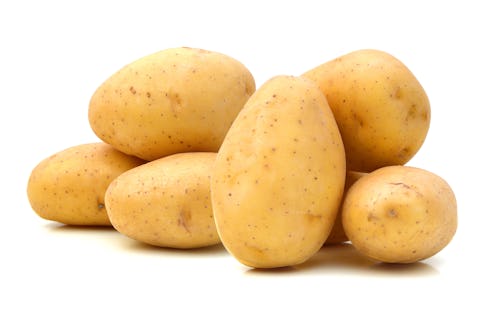
Care for a spud latte?
Domesticated in the last 10,000 years in modern-day Peru, the humble tuber was the staple crop of the Inca long before its association with Ireland or Idaho. Now one of the top ten most-produced crops in the world by volume has morphed into unrecognizable forms like chips and gnocchi, processed into products like shepherd’s pie and stationary. The applications of the starchy root vegetable know no limits (they even grow in space!) and from hashbrowns to Hasbro, the potato delivers. Now, it’s ready for its next journey: becoming “milk.”
Amidst an exploding market for alternative milk potato milk, which is now available in the U.K. and Sweden, was inevitable. In some ways it’s the next logical step after outlandish dairy alternatives like pea milk and banana milk given the fact people have been drinking potatoes for centuries (distilled and fermented into vodka). If the thought of runny mashed potatoes doesn’t whet your appetite, I can’t blame you, but I also suggest you recall where cow’s milk comes from.
The next big thing—
Forbes writes that the British market for plant-based milk is worth about £400 million ($541.5 million) a year. Following the milk-ification of unlikely subjects like the almond, macadamia nut, and quinoa, “it is the turn of the potato,” writes British retailer Waitrose in its annual food and drink report, announcing that it would begin stocking its shelves with potato milk in February 2022 to meet demand.
The only commercially available potato milk is a brand called Dug based in Malmö, Sweden — the same city that holds the headquarters of Oatly, the small and quirky company that invented oat milk back in the ‘90s. Despite the fact that the nation is known for putting bananas on pizza, its culinary exports have been impressive. Though the product is only available in the U.K. and Sweden, it may be coming to the U.S. once it gets a footing in Europe. “At the moment the focus lies very much in making the U.K. launch a huge success, but we certainly see the U.S. as being a key strategic market in the future,” the marketing manager of Dug’s umbrella company told Thrillist.
According to Dug, growing potatoes is twice as efficient as growing oats in terms of land and 56 times as efficient as almonds in terms of water use. The company also claims that its potato-based milk has a 75 percent lower carbon impact than dairy.
Dug graced headlines on potatopro.com back in 2017 for its patented blend of water, potatoes, rapeseed oil, and sugar along with an emulsifier, vitamin D, and an acidity regulator. Developed by Eva Tornberg of Lund University, the concoction won the 2021 World Food Innovation Awards’ “Best Allergy-Friendly Product” prize and spawned a murmur of media attention. But not everyone is smitten by the spud smoothie.
When ads for the product decked out in minimalist blobcore containers appeared on Claudia Aïcha’s TikTok, the 20-year-old from Gothenburg, Sweden ordered a package of Dug’s barista potato milk. When it came, she was disappointed. “Holy fuck it was so bad,” she told me. “The only use for it I could find was putting it in a stew and just flavoring the fuck out of it. I cannot stress this enough,” she continued. “They have to redo the formula.”

DIY—
Since I couldn’t access official Dug potato milk (and wasn’t sure I wanted to, after consulting Claudia), I made some of my own. On its website, Dug insists it isn’t made “by simply squeezing potatoes.”
My homemade potato milk, though, most certainly was made by simply squeezing potatoes. Scads of recipe blogs have directions that all basically say the same thing: boil potatoes, blend them up, add salt and a sweetener, and strain out the liquid. As I stood in my kitchen squeezing potato juice through a cheesecloth, I was pleasantly surprised by the liquid that trickled out. It smelled earthy and inoffensive. When I tasted it, it had no distinct flavor. The taste was mild, the texture was milky, and it was good in coffee.
I didn’t go as far as making ice cream out of homemade potato milk like one person on Reddit who liked the texture because, “it made it really thick and creamy.” But I’m certainly not opposed to making it again.
But hey, potato milk doesn’t have to be for everyone. Perhaps you prefer your potato liquid fermented, distilled, and poured into half a glass of orange juice. Perhaps you’re a red-blooded American who likes milk straight from the udder. Perhaps you simply do not know what a “potato” is.







